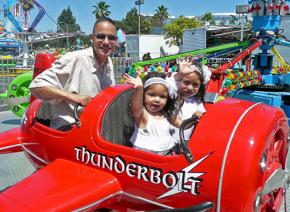They killed Jose twice
reports on Rosie de la Trinidad's struggle to win justice for her husband--who was killed by Los Angeles County Sheriff's Department deputies.
IN WHAT has become a family ritual--on at least a weekly, and sometimes a daily basis--Rosie de la Trinidad and her two daughters water and lay fresh flowers at the gravesite of her late husband, Jose de la Trinidad, who was killed more than a year ago by two Los Angeles County Sheriff's Department (LASD) deputies.
When talking about Jose's death during a recent interview, Rosie said, "Half of me died." She continued, "I thought to myself when it happened: 'We'll never be the same.'"
Rosie's innermost thought has rung true since that tragic November night in 2012. Since then, aided by both family and friends, she's become an advocate on behalf of Jose, leading a fight that has included vigils, marches and media interviews.
The enormous tasks associated with fighting for Jose's name, which the LASD tried to sully, has consumed much of Rosie's time, along with caring alone for her two daughters, 7-year-old Jocelynn and 4-year-old Ariana.
It wasn't until a mid-November vigil, held to commemorate the one-year anniversary of Jose's killing, Rosie said, that she had time to pause and think about what transpired over the last 12 months. "You're enraged at first," Rosie said. "Immediately after Jose was killed, I was in fight mode. Grief took its toll. It was gradual for me. But as time passed, just realization. Realization was afterward. Coming to grips with the reality that he's not here anymore."

The initial "fight mode" Rosie recounted was for good reason. Jose, like nearly all victims of LASD terror, was in fact killed twice: once by bullets, a second time via the media.
JOSE was 36 years old and worked two jobs to provide for his family. He was well-liked by all he interacted with, according to personal accounts by family and friends. However, after he was killed at the hands of LASD deputies, both the police and LA media repeatedly referred to him as a "suspect."
On the night of November 10, after Jose, who was the passenger of the car his brother Francisco was driving, left a relative's quinceanera, deputies attempted to pull them over for speeding. But after a brief chase, according to the LASD, Jose "jumped out of the passenger seat" and exited the car on a block in Compton.
In justifying their shooting of Jose, LASD deputies Angel Grandes and Alexandro Gonzalez employed the common police excuse of saying they believed he was "reaching for a weapon." Both deputies also claim that Jose started to "run toward them," causing them to fear for their safety.
However, not only was Jose unarmed, but the LA County Coroner's report showed he was shot five times in the back, and twice in the hip and right forearm, also from behind. Moreover, the deputies' version of events was made all the more implausible due to a witness, unbeknownst to the police, who watched everything play out through her bedroom window.
Estefani, who declined to give her last name, told the Los Angeles Times in January that Jose complied with deputies' commands and had his hands on his head. Thirty minutes after Jose was killed, she said LASD deputies canvassed the area for witnesses and came to her door.
Estefani said the deputies repeatedly asked her what direction Jose was facing when he was shot, an obvious attempt at coercion. She added, "I told them, 'You're just trying to confuse me,' and then they stopped."
Initially, LASD mouthpiece Steve Whitmore denied the failed attempt at witness tampering. Then, the department acknowledged the interaction, attributing its prior denial to "lack of communication between deputies and lieutenants involved."
Rosie's former attorney, Luis Carrillo, after learning of the encounter, wrote a letter to the FBI at the time, part of which read: "These efforts of sheriff's investigators appear to be an obstruction of justice." On December 9, the FBI charged 18 current and former LASD officials with ongoing inmate abuse scandal in the county's jails--revealing further the systemic violence of the department.
IMMEDIATELY AFTER Jose was killed, Rosie began doing press to counter the LASD's attempted smear job on her husband's character. Her efforts were helped along by a handful of friends and family.
After a couple months, Rosie said, through outreach, she learned of and joined a group of Southern California families whose loved ones have also been killed by police. The Justice Warriors, as the coalition is known, have participated in actions for Jose.
Rosie described the protests she has taken part in as "therapeutic." She also said, "Another advantage of struggling together is that you don't feel isolated."
Since Jose's killing, Rosie has also taken an interest and become aware of the intersecting issues of mass incarceration, gang injunctions and the Pelican Bay prison hunger strikers. "They're (the police) abusing their power everywhere," she said. "The injustice affects mostly Blacks and Latinos."
Jose, who Rosie described as a "hands-on dad," is no longer around to accompany Jocelyn to daddy-daughter school dances or to help Ariana with gardening--two fond memories both girls often talk to their mother about. But Rosie has vowed to continue to fight back in his memory. She discussed what she considers justice:
First, admit it. Admit that Jose was not a suspect, did what he was asked to do, and was killed anyway. We need a public apology. Accept what you did...Create some change within the department. Hold these deputies accountable.
As more families whose relatives have experienced police terror like Rosie's unite in struggle and continue to become aware of a host of issues, which are all linked with the criminal injustice system, a mass movement can then take shape and demand accountability.


